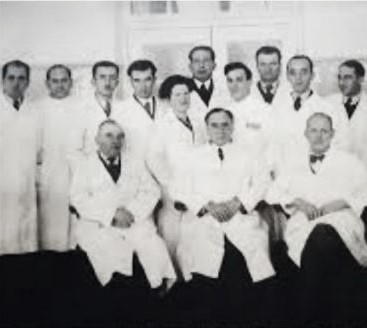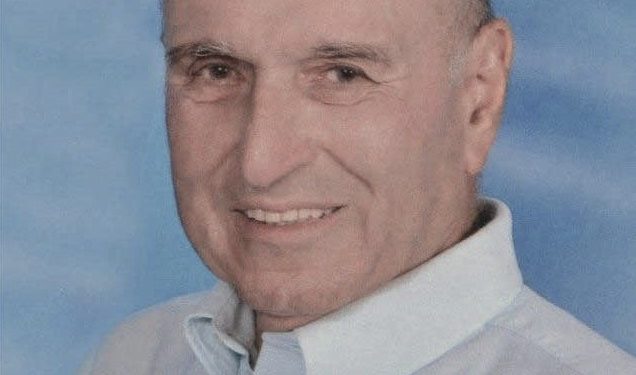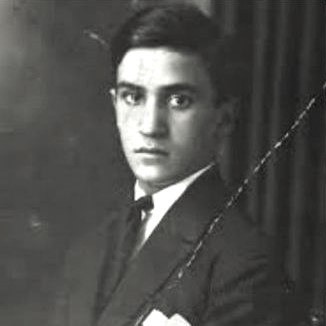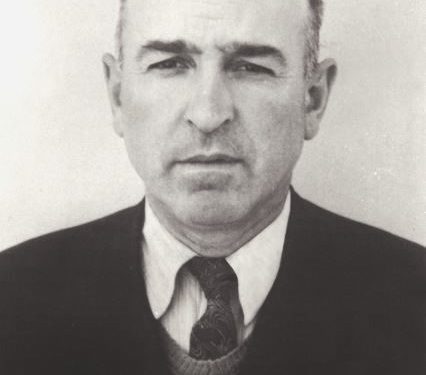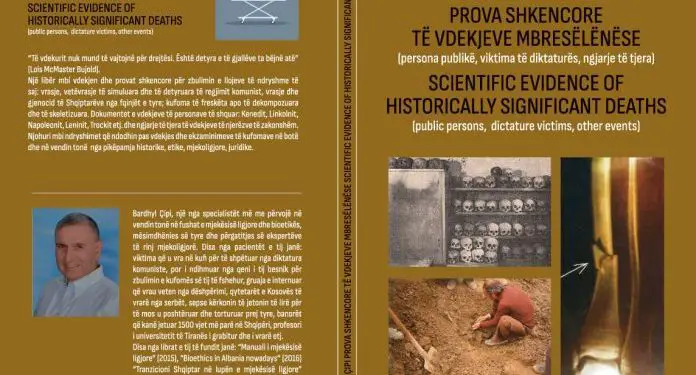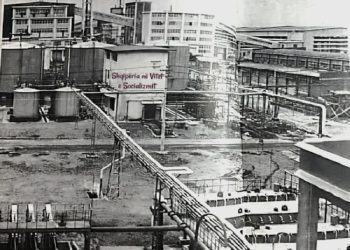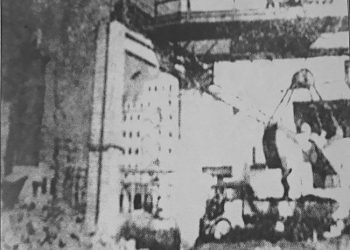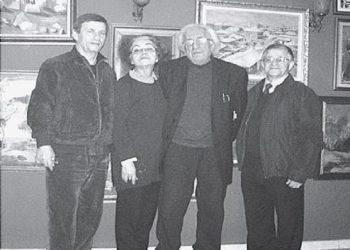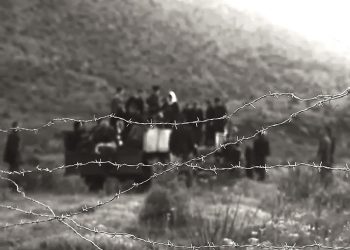By Prof. Dr. Bardhyl Çipi
Part One
SCIENTIFIC PROOFS OF IMPRESSIVE DEATHS
(Public figures, victims of the dictatorship, other events)
Memorie.al / Bardhyl Çipi, one of the most experienced specialists in our country in the field of Forensic Medicine and Bioethics, their teaching, and the training of young medico-legal experts. Some of his patients include: victims who were killed at the border trying to escape the communist dictatorship, but who were found with the help of his loyal dog in the discovery of his hidden corpse, the interned woman who killed herself out of despair, citizens of Kosovo killed by Serbs for seeking to live free and not be humiliated and tortured by them, inhabitants who lived 1500 years ago in Albania, a professor from the University of Tirana who was robbed and killed, and so on. A book on death and the scientific evidence for uncovering its various types: murders, suicides, those stimulated and forced by the communist regime, murders and genocide against Albanians by their neighbors, fresh or decomposed and skeletal corpses. Documents on the deaths of prominent figures: Kennedy, Lincoln, Napoleon, Lenin, Trotsky, etc., and other events involving the deaths of ordinary people. Knowledge about the changes that occur after death and the examination of corpses in the world and in our country, from a historical, ethical, medico-legal, and legal point of view. Some of his latest books are: “Manual of Forensic Medicine” (2015), “Bioethics in Albania Nowadays” (2016), “The Albanian Transition under the Magnifying Glass of Forensic Medicine” (2018), “Forensic Medicine and Criminalistics” (2020).
A few words…
When a person does not sincerely express what he feels is the truth, according to a wise saying, it will bring the death of a part of him. This is the reason that in this book of studies and memoirs, I have openly and impartially analyzed mainly the issues of death, which is not the opposite of life but is considered a part of it. According to the professor of forensic medicine, Simonin, “the corpse of the deceased is a ‘mute witness’ that carries on its skin, in its tissues and organs, the external and internal traces of the causes that preceded or caused the death. Therefore, medico-legal expertise will be a complex action that, by making it possible for the ‘corpse to speak,’ will succeed in discovering and reconstructing the event and the circumstances of the death!”
“In violent deaths,” adds the distinguished criminalist Locard, “the criminal marks the crime, leaving behind a trace of his guilt. There is no evildoer, no matter how cunning, who does not unintentionally leave behind evidence of his passing. These traces are witnesses that never lie.” These thoughts are reflected in the examinations I have conducted for the deadly crimes against the victims of the communist dictatorship, because of their beliefs in a free life, not an isolated and persecuted one-crimes that have left a lasting impression on our people. To these beliefs must be added those of those who are no longer living but suffered trampled and humiliated by this regime.
Therefore, for all of them, we can recall the wise words of George Eliot: “The dead are never dead for us, as long as we do not forget them.” I express my gratitude for the support and help in preparing this book, first and foremost to my family: my wife Margarita, my sons Pirro and Rezart, and my sister Mariola. I also want to thank my colleagues in Forensic Medicine, with whom I have collaborated on a portion of the cases presented.
THE AUTHOR
Introduction
In this book of studies and memoirs, I have presented scientific evidence of the illnesses and deaths of some public figures, from our country and abroad, of those who were persecuted, as well as of some grave events, mainly those leading to death. For this, I have relied on the rich knowledge I have gained over a very long period of more than 50 years, from the examination of several thousand corpses, the review of other difficult cases, which have also been reinforced by the specializations and trainings I have undergone in developed countries and reflected in my numerous publications.
A part of these events have also been presented in the books “The Albanian Transition under the Magnifying Glass of Forensic Medicine,” “Manual of Forensic Medicine,” and in other previous publications. But another reason that prompted me to write this book was that today we are living in a period when many events can be revealed and scientifically investigated, which were previously kept secret in our country during the time of the communist dictatorship.
Before I give you some more concrete data on the issues that will be addressed, I think it would be necessary to tell you something, perhaps a little lengthy, about my life, especially my professional one, and the family I was born into and grew up in, as well as some thoughts or opinions on the current situation in Albania.
I, Bardhyl Çipi, after graduating with excellent results from the Faculties of Medicine and Law at the University of Tirana, began to practice the professions of anatomist and forensic doctor at the Faculty of Medicine in Tirana. For the first 20 years, this was done during the time of the communist dictatorship until the 1990s, when this regime was overthrown. In fact, I was born, grew up, was educated, and received my schooling during the time of the communist state, so I am, so to speak, its product.
At that time, despite the isolation and poverty we lived in, the class struggle, the unnecessary inclusion of the so-called revolutionary triangle (Learning – Physical and Military Preparation), the forced inclusion of communist ideology subjects in the school curricula of our country, the nonsensical rules for clothing and external appearance, the fear of criticizing the government, and many other negative aspects, I was nevertheless educated in public schools and the university by teachers and pedagogues with a high level of preparation, who were serious and dedicated to their duty.
This, as well as my tireless work in my studies and then in practicing the profession of a lecturer and doctor, influenced the achievement of high results in my lessons and work after finishing medical school. These were followed by my involvement in many studies and publications and were crowned with the successful defense of my doctoral dissertation, despite the fact that forensic medicine was considered unimportant, unsupported, and even undesirable by other doctors.
My father, Dr. Spiro Çipi, was the first forensic doctor in Albania, passionate about this delicate profession. He not only guided me in my general, medical, and legal education but also encouraged me to practice the specialty of Forensic Medicine. In fact, during the first 15 years of practicing this new medical profession in Tirana, he became for me, before he died, the most valuable leader and consultant in carrying out countless medico-legal expertises.
But within the framework of the communist dictatorship’s class struggle, my father was considered of bourgeois origin, having completed his studies in Western countries and belonging to a family whose property was seized by the government, even though he and his family had helped the National Liberation Movement. The same was true for my mother, Anastasi (even though she was a first cousin and close friend of Margarita Tutulani), because her mother (my grandmother Urani) was the wife of one of the richest merchants in Fier.
Not only that, but this regime seized our property, causing family dramas, by killing my grandmother’s husband, a true patriot and deputy of Fier in the Congress of Lushnje, which brought a strong shock to my uncle, followed by an incurable mental illness. At that time, I was just born, but later, from childhood and then as I grew up, I constantly felt and lived the despair that my parents, especially my mother and grandmother Urani, showed about these tragic events in their families. My father, Spiro Çipi, was more reserved in expressing his dissatisfaction with the regime about these bitter events in their families.
However, due to these biographical data, which were considered negative for the communist regime, my family was not looked upon favorably. I began to understand this better when I was older, even though we were not political persecutees (with the exception of grandmother Urani in Fier, who did not have a Front card and was considered declassed, with her husband sentenced to death). In such a situation, which continued for several decades, we lived with a shyness that followed us throughout this period.
My father told me about the first years of the establishment of communism: “I lived constantly with the fear of being arrested at any moment. Unconscionable nurses would spy on me for every action I performed, but I worked with such persistence and dedication in the humanitarian duty of a doctor, not leaving even the smallest reason for them to find fault with me.” But thanks to our intelligent father, who taught us to adapt as much as possible, without changing our characters and studying very hard, my sister, my brother, and I managed to become good professionals in our fields.
One piece of advice about relationships with people that my father gave us, which my sister and I always remember, was this: “You must not forget that no matter how bad the person you are dealing with is, he also has a good side, which you must hold on to, while preserving your independence and character.” For his part, my father tried with all his heart, spending a large part of his energy, to ensure that the three of us children had the most complete education possible.
Later, when my father, Dr. Spiro Çipi, resumed practicing the profession of forensic medicine, he also exploited the superiority he had gained from his perfect medical and legal training, as well as in the fields of Forensic Medicine and Psychiatry, in the studies he completed at the University of Sorbonne in Paris, during his 10-year stay there, where at that time he was one of the few intellectuals to publish a scientific book at the University of Paris. He maintained his professional dignity, even more so because of the special passion he had for the science of forensic medicine, despite being employed at the Central Criminalistics Laboratory, which was under the Ministry of Internal Affairs.
Thanks to my very high study results, I was appointed as a lecturer at the Faculty of Medicine in Tirana. This appointment was made because I was the best student among the graduates of the Faculty of Medicine that year. Ironically, despite my successful practice in teaching and participation in numerous scientific activities, for almost the majority of these years, I remained with the lowest pedagogical title, that of assistant. However, due to our origin, an unfriendly attitude was held toward us, both in the building where we lived and in other circumstances, for years, the worst of which was my sister’s dismissal from work, based on letters that had come about her bad biographical origin.
But during these years, I had sincere and friendly relationships with all my peers in high school and in the building where I lived. Later, in my studies at the Faculty of Medicine, I again maintained close friendly ties and participated in many other activities with all my fellow students, which continue even today. During my years of work at the Faculty of Medicine as an assistant and lecturer, I was very close to the students I taught, becoming active with them in military training, physical preparation campaigns, and other activities. Likewise, I have the best memories of all my fellow pedagogues and medico-legal experts.
In these friendly relationships with such a large number of people, despite their different characters, most were simple and sincere. However, the feeling of insecurity, of shyness toward the regime in which we lived, ingrained in me since childhood, continued again, but now it was fading until the overthrow of the communist dictatorship, and even after. For this reason, many times in those years, they would tell us, according to a popular saying, “that you cannot become brave, because you are killed from the cradle.”
But it should not be forgotten that the feelings of fear have caused the feeling of dissatisfaction with the previous regime to be born and strengthened in the human mind, as well as in me and my family. I have expressed this by publicly condemning the communist regime through publications in the press or through the performance of many medico-legal examinations to uncover its crimes. But sometimes, these feelings are revived in us even now, at least in me, because in our country today, the descendants of the leaders and executors of the communist dictatorship are in power. There are many such cases that have happened to me and my family in recent years, which I intend to present later.
From all that I have said, I was encouraged in this book, among other things, to also analyze the scientific evidence of some of the criminal acts, or those suspected of being such, committed during the communist regime, which I have encountered during my very long practice of the profession of Forensic Medicine. I think this will be important to further strengthen the value of the countless documents that have emerged or are still being discovered, as well as the numerous testimonies, from those who have died or are still alive, but who were persecuted, or whose relatives were killed for political reasons by this regime.
From what I have read and studied, what has caught my eye is that in none of these documents and testimonies that I have encountered have I found that any forensic doctor participated in carrying out illegal acts or tortures, often fatal, against political persecutees in the prisons and internment camps of that time. On the other hand, I want to recall that in every medico-legal examination I performed, mainly for ordinary crimes: murders, suicides, injuries, accidents, rapes, etc., which were numerous at that time, without excluding those of victims for political reasons, I rigorously respected the moral principles of expertise.
Among them, I mention the principles of objectivity and impartiality. For this reason, despite my personal feelings of dissatisfaction with communism, which have faded over the years and have now almost disappeared, I have always maintained a neutral stance while performing these medico-legal expertises, with the aim of discovering only the truth based on scientific evidence. In this book, I have also examined the deaths of Mehmet Shehu and Nako Spiro, officially declared as suicides with a firearm, but with great doubts that they may have been murders, as were the other countless and documented murders ordered by the communist dictator. For both of these cases, from the review of their forensic documents, I have used the criterion of Forensic Criminalistics: “the direction of the shot.”
According to it, when the direction of the shot into the body was oblique: from top to bottom, as was found in both of these criminal deaths, the greatest possibility is that they were murders. To reinforce this idea, together with a criminalistics expert, I have conducted a detailed study, based on the review of several dozen known cases of firearm deaths in our country and the relevant contemporary foreign literature. I have also included this study, which was presented at an international conference of the Faculty of Law at the University of Tirana a few years ago, in this book.
Also, the issue of medical secrecy after death has been addressed, especially for public figures, where the diseases and death of Enver Hoxha are analyzed. Then I have described and analyzed the exhumation of Enver Hoxha’s corpse, those of the suicides of President Omer Nishani, and the murders and suicides of some other leading figures of the communist regime in our country.
A special place is dedicated to the presentation of the medical and medico-legal aspects of the diseases and deaths of prominent leaders of some European countries, such as: Napoleon, Lenin, Stalin, Hitler, a study on the murder of Trotsky and the murders of two US presidents: Abraham Lincoln and John Kennedy.
An interesting topic is that of the results of medico-legal examinations of crimes, murders, suicides, and others, committed during the communist dictatorship for political reasons. One of the most serious of these atrocities was the extrajudicial execution of 22 intellectuals in 1951, on the pretext that they had participated in placing a bomb at the Soviet embassy in Tirana, as well as several other criminal deaths committed by this regime.
In addition to these, there are several topics related to the scientific aspects of Greek soldiers’ cemeteries in Albania, the murders of Albanian citizens of Kosovo by the Serbian army and paramilitaries, discovered after the war of 1999, deaths from carbon monoxide, the ethical-legal aspects of the COVID-19 World Pandemic and its vaccine, some deaths from ordinary causes that occurred in our country in different years, etc.
A rare historical examination is that of some skeletal remains that were recently proven to belong to inhabitants who lived in our country more than 1500 years ago.
Finally, some data will be analyzed from a historical, ethical, and medico-legal point of view on the examination of corpses in the world and in our country, accompanied by some knowledge about death and the changes that occur after it in the human body.
In conclusion, I think this book in a special field, for which publications are lacking in our country, will be useful for specialists in Forensic Medicine and Criminalistics, justice and police employees (prosecutors, judicial police officers, judges, lawyers), and students of medical and legal schools.
Likewise, it will introduce the general public and other citizens who want to broaden their horizons and curiosity for such specific and attractive fields. On the other hand, it will inform those who have been persecuted or their descendants, whose relatives were killed by the communist dictatorship, about the various issues addressed in this book. Memorie.al




